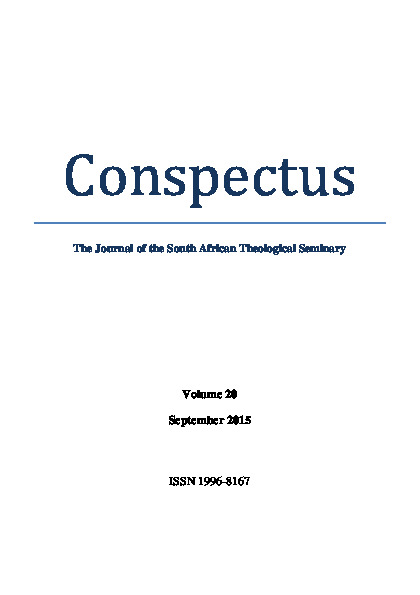Volume 20
September 2015
Curle, A Theological Critique of uBuntu
This article hopes to open a biblical discussion on the African philosophy of Ubuntu2 . The discourse critiques the current Swazi praxis—both from a traditional and postmodern perspective; gives a better understanding of uBuntu (especially in its rural context where patriarchalism and the Ancestral cult are so conspicuous); provides a biblical evaluation, and considers whether Ubuntu could be defended as a universal philosophy. Having reviewed the Swazi praxis, the article considers Paul’s statement in Romans 2:14–15 regarding God’s law being written on the hearts of all mankind. The paper argues that the statement refers to the socalled Golden Rule (Matt 22:37–39), which appears to have been prevalent throughout the primordial cultures. The research concludes that Ubuntu is only viable within a community that upholds the principle of sacrificial brotherly love as advanced by Christ Jesus.
Du Toit, Anti-Judaism in the New Testament
In this contribution the hermeneutical problem of ‘antiJudaism’ in relation to the New Testament is approached from an Evangelical perspective. The term ‘anti-Judaism’ is especially problematic in the light of the hermeneutical distance between the Ἰουδαῖοι of the New Testament and contemporary Judaism. The main questions asked are whether the New Testament can be free of ‘anti-Judaism’ and whether there is room in prevalent New Testament scholarship for an Evangelical approach to this topic. The concepts of both fulfilment and replacement, which play an integral part in attempting to answer these questions, are identified as integral to the New Testament. The latter conclusion is reached from an overview of various New Testament texts with a focus on the Pauline literature. The conclusion is reached that there are instances in the New Testament where a stand is taken against Ἰουδαῖοι, yet not as distinct from other people, but as part of an element of judgment against all sinful people, which is inherent in the gospel.
Lioy, Paul’s Theology of the Cross
This journal article builds on the work of an earlier essay (Lioy 2015) to undertake a case study analysis of one representative passage in Paul’s writings through the prism of his crucicentric thinking (especially in dialogue with a confessional Lutheran perspective). The major claim is that the apostle’s theology of the cross (in Latin, theologia crucis) helps to clarify his apocalyptic view of reality. The corresponding goal is to validate the preceding assertion by exploring Paul’s cruciform mindset in 2 Corinthians 11:16– 12:10.
Williams, Review of Macchia, Justified in the Spirit
In Frank Macchia’s work, the author attempts to ‘develop a pneumatological theology of justification inspired by a Pentecostal metaphor, the baptism in the Spirit’ (p. 14). He proposes that divine koinonia, or the mutual indwelling of the Trinity, is the most fruitful context for bridging the gap between the usually isolated doctrines of creation, justification and sanctification. This noted Pentecostalecumenical theologian takes a deep look at both the Protestant and Catholic doctrines of justification, moving past both in order to reconcile them within the Spirit’s embrace. Therefore, Macchia highlights the role of pneumatology in order to lead ‘toward a Trinitarian integration of justification’ (p. 293).

